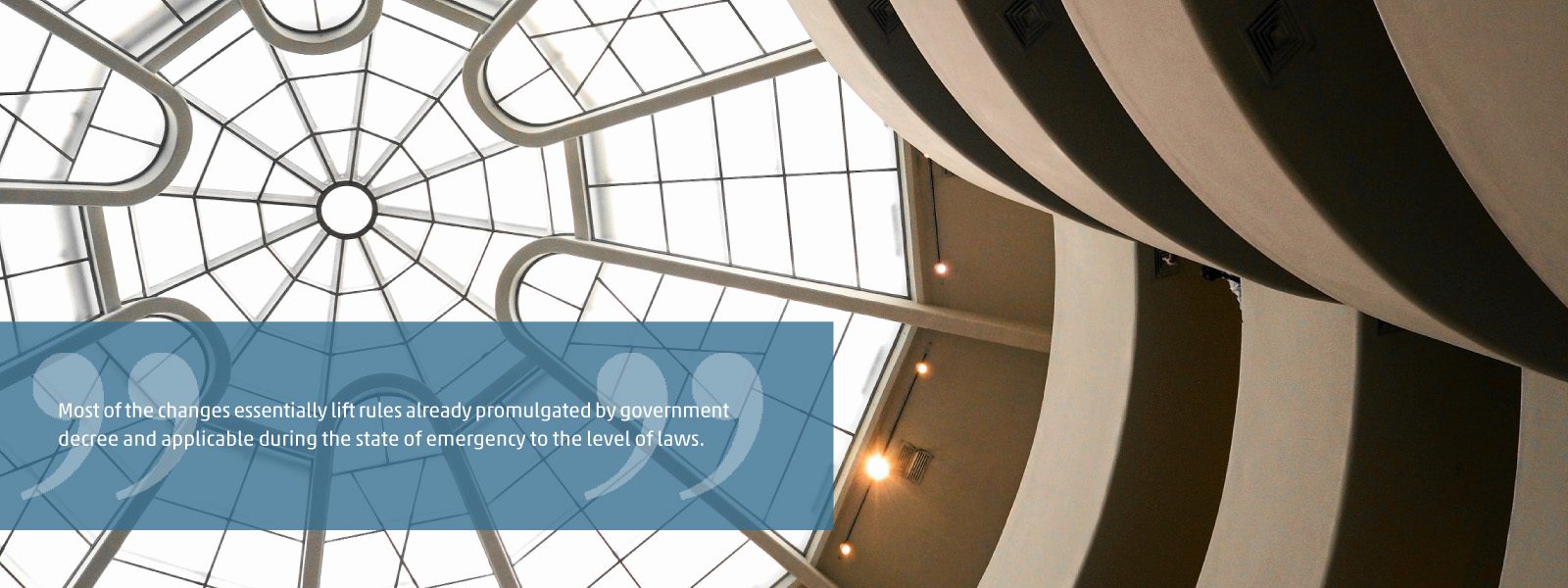On 6 June the Government submitted to the Hungarian National Assembly its bill on contributions from airlines and amending certain tax laws. The 2023 spring tax amendments do not contain any substantive changes, and we could say that the high rates of the EPR system related to environmental protection or the 13% social contribution tax on interest published in the Hungarian Gazette on 31 May had a greater impact than the 152-page package of tax amendments.
Most of the changes essentially lift rules already promulgated by government decree and applicable during the state of emergency to the level of laws, so they will continue to apply after the state of emergency has passed.
Extra profit taxes now law
- The airlines’ contribution (specific tax) is here to stay as the proposal transposes it from a state of emergency decree into law.
- Likewise, the 2023 spring tax law amendments enact the rules on the bank tax, transaction tax, income tax on energy suppliers, excise tax and public health product tax from decree level into law.
Personal income tax
The 2023 spring tax law amendments also enact, in an unchanged form, the following measures previously promulgated in the government decree on the state of emergency:
- allowance for mothers under 30;
- the additional family allowance for families with a permanently ill or severely disabled child (i.e. the family allowance is raised by HUF 66,670 (roughly EUR 180) for individuals who care for a person who is permanently ill or severely disabled as per the Act on Family Allowances, per month of entitlement and per eligible dependant);
- amendments to the tax rules on the discontinuation of the Széchenyi Rest Card sub-accounts (e.g. the part of the employer allowance for the SZÉP card exceeding the recreational allowance (HUF 450,000 – roughly EUR 1,217 – or a proportion thereof) is considered an other benefit);
- an increase from 15 to 30 HUF (roughly 4c to 8c)/km in the amount of the commuting allowance that can be disregarded when calculating income;
- the basis for calculating public levies payable for employment in simplified employment arrangements and the related pension benefits is aligned to the minimum wage;
- payers are not liable to pay the simplified contribution to public revenues.
Changes to SZÉP cards
Two weeks after the afore-mentioned bill was tabled, one positive rule change has been introduced for SZÉP cards. According to Government Decree 237/2023, it will be possible to buy cold food with a SZÉP card between 1 August and 31 December 2023. What is more, during the same period, a limited-purpose account opened for SZÉP card benefits may be credited with a one-off benefit of up to HUF 200,000 (roughly EUR 541), in addition to and irrespective of the annual statutory recreational allowance.
Trusts
Under the current provisions of the Act on Personal Income Tax, an individual who transfers assets to a trust or private foundation is not liable to pay tax on the transfer of the assets, and if the beneficiary of the trust or private foundation receives a benefit in cash or in kind from the assets under management or the assets of the private foundation (i.e. from the capital part, not from the return on the assets), the value of the assets thus acquired is tax exempt. The 2023 spring tax law amendments do away with the favourable taxation options, we explain the details on this in a separate article. (Click here to read it!)
Crypto-trading
- Transaction losses can be accounted for even if the individual received no income from a transaction with a cryptoasset in the given year.
- The scope of expenses for acquiring a cryptoasset is supplemented with when an individual acquires the cryptoasset itself as income (e.g. received dividends in this form.)
Corporate tax
- The 2023 spring tax law amendments abolish the ban on deducting advertising costs and the related transitional rule.
- The time limit for claiming unused losses accrued up to the last day of the 2014 fiscal year is to be abolished.
VAT
- Taxpayers not established in Hungary but established in a Member State of the European Union will be able to reclaim input VAT on the purchase of Hungarian property under the special tax reimbursement procedure.
- The previously announced e-receipt concept will be set out in a ministerial decree, and the amending regulation will lay down the necessary enabling provisions and basic definitions.
- Mandatory return fee scheme for packaging: the return fee for non-reusable products subject to mandatory return is not part of the tax base for the supply of goods, and no VAT is payable on the return fee for non-reusable products subject to mandatory return. What has not changed is that the deposit for deposit-refund products forms part of the tax base of the supply, and when the deposit is refunded upon the return of the product, the tax base is subsequently reduced. It is a taxable event, and therefore a tax liability, if a non-reusable product subject to mandatory return is not recycled. The taxpayer operating the mandatory return scheme incurs the tax liability.
- Withdrawal from tax group status: in terms of rights and obligations regarding VAT, withdrawing from tax group status shall be treated as if the entity was terminated with legal succession.
Local taxes
The 2023 spring tax law amendments will extend the advance payment rule for those eligible for the simplified local business tax base assessment to the full range of taxpayers switching to this tax base assessment. It introduces new local business tax liability provisions for air passenger transport companies, while for temporary agency workers it makes the place of work of the agency workers a permanent establishment triggering a local business tax obligation.
UPDATE! According to the bill, temp agencies will create a permanent establishment within the territory of a local government if the staff temped there perform work amounting to at least 1440 working hours. The motion tabled in the meantime and adopted on 4 July raises the number of hours resulting in the creation of a permanent establishment to 21,000 hours, since this number of hours ensures that the temp agency’s tax base only has to be shared between local governments where there is a substantial staff presence.
For airlines, a permanent establishment is not only a representative or other office, for example, but also the place where their flights depart, the airport. The proposal also defines which entities can be considered air passenger transport operators. Accordingly, the special rule only applies to entities whose sales revenue consists overwhelmingly of air passenger transport (ticket revenue) and certain related services (e.g. seat reservation fee, baggage fees, surcharges). The consideration payable for using passenger flights departing from Hungary and related services (e.g. baggage transport, priority seating, VIP lounge) shall also be considered part of the net sales revenue.
Innovation contribution and transfer pricing rules
The 2023 spring tax law amendments will bring the assessment of the innovation contribution base into line with the local business tax base from a transfer pricing perspective. The arm’s length price to be considered for the contribution base will in future be determined according to the transfer pricing methodology prescribed in corporate taxation, which, among other things, includes the obligation to adjust to the median value.
Vehicle tax
Instead of twice a year, payment is now due once a year. Taxpayers unable to pay the tax in one lump sum can do so in five monthly instalments based on a request submitted according to the proposal.
Social contribution tax
Guest workers employed under the Act on Employing Guest Workers in Hungary are not considered labour market entrants for the purposes of the labour market entrants’ allowance.
Tax administration, tax procedures
- The 2023 spring tax law amendments extend the automatic payment in instalments facility to legal entities too.
- In the future, the tax authority will cancel a tax number if the taxpayer fails to comply with the obligation to submit a recapitulative statement on VAT or the monthly tax and contribution returns within 180 days of the statutory deadline, despite reminders from the National Tax and Customs Administration.
- It will also be possible to apply for binding rulings for standard contracts. In addition, the fee for a binding ruling application will also increase (HUF 10 million – roughly EUR 27,000 – for a standard contract, HUF 8 million – roughly EUR 22,000 – in other cases, HUF 12 million – roughly EUR 32,000 –for an urgent application).
- At present, failure to notify changes does not mean that a rectification request is sent out, the tax authority immediately imposes a fine. Under the proposal, the tax authority will also ask the taxpayer for rectification if it has not complied with its obligation to notify changes or has not done so correctly.
- Instead of having no public debt at all, it is sufficient if the taxpayer has no public debt exceeding HUF 30,000 (roughly EUR 81), and no tax debt exceeding a net HUF 5,000 (roughly EUR 14).
- When determining reliable taxpayers, the NAV does not take into account enforcement requests that do not exceed HUF 100,000 (roughly EUR 270).
Accounting provisions of 2023 spring tax law amendments
Companies whose average net sales revenue in the two financial years preceding the given financial year – or in the absence of such, the net sales revenue expected in the current year – exceeds ten million forints must entrust a registered accountant with managing and directing their bookkeeping and with preparing financial statements. Given the increased costs and inflationary effects in the meantime, it is justified to increase the current threshold of HUF 10 million (roughly EUR 27,000) to HUF 20 million (roughly EUR 54,000).
UPDATE! The tax law amendments were adopted by Parliament on 4 July. The amendments will enter into force gradually, depending on the given tax types and provisions, on the day after the promulgation, on 1 August 2023, on the 31st and 60th days after the promulgation, while some special provisions will take effect thereafter.
In this article, we have tried to provide a thorough summary of the most important parts of the 2023 spring tax law amendments as proposed on 6 June. If you have any questions about the rule changes detailed here, please contact the tax consulting team of WTS Klient Hungary who are always at your disposal.










